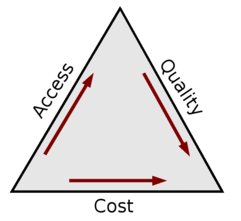Currently in South Africa, here is widespread national protest in higher education institutions against increases in student fees. These protests are taking place against a backdrop of widespread government corruption, a pretty stagnant economy, widespread unemployment, widespread poverty, and low incomes even for educated professionals. Given that the issue of access to education was a major feature of the struggle for liberty in South Africa, the increase in university fees is both necessary and morally indefensible. This is a logical paradox.
One of the many things I learned from Sir John Daniel over drinks at a hotel in some warm country that I forget now, possibly Tanzania, is that there is a rigid iron relationship among access to education, its cost, and its quality. He calls this the iron triangle of higher education. The logical paradox arises from this triangle.
The relationship among cost, quality, and access is unbreakable. You can reduce cost, and thereby increase access, but unless you find a way to meet costs another way, you inevitably decrease quality. The particular relationship among these parameters is fixed within a given economy. If you increase quality, you will increase cost and decrease access. You can get access to everyone if you decrease the cost to zero, but you also decrease quality to a reasonable approximation of zero.
Countries who have broken this relationship have done so by having strong enough economies to allow taxes to cover all costs, thus not really breaking the relationship, just meeting the costs from a different basket. Some countries have accepted that their economy dictates that quality will be lower in order to maintain access.
The best solution to this conundrum would have been to have not caused the economy to stagnate, not allow such widespread corruption in the first place, and to grow investment in education along with economic growth. But in a stagnant economy like ours, it will be very difficult to break out of this.
I agree that higher education should be free for all, irrespective of their economic status. To the extent that rights are real, this should be a right of citizenship.
The crisis in education is probably the single most important challenge that the country faces. Education is the future of the country, and certainly the future of the economy. If the crisis is not solved, government is merely ‘fiddling while Rome burns’.
In South Africa solving the need for free education for all, and addressing other aspects of the education challenge, can only be achieved by the following means:
- Increase the quality of government, and increase the focus on education at all levels, especially higher education. Do this even if it means taking risks in other areas. For example, minimum military spending to allow us to meet international commitment at the bare minimum level, and no more. Divert those funds into education. According to Max du Preez, South Africa only spends 0.75% of its GDP on tertiary education, which is less than the African average, and well below international norms. So government HAS to come to the party.
- Sell off all state owned enterprises, even if it means selling them at bargain basement prices. Do not allow the revenue generated to disappear into the fiscus, rather create a national education fund and use it to fund higher education 100%, based of course on certain criteria of delivery as is the case currently for the existing national subsidy.
- Make use of each and every resource that exists in the country, irrespective of age, dermal melanin concentration, eye colour, gender, sexual orientation, religion or shoe size. Scour the earth for the best people to teach the next generation. Growing the standard and numbers who pass through higher education is more important than anything else.
- Put in place programmes to grow the economy, focus on innovation, entrepreneurship, and creativity. Spend some of these newly available resources to create the world’s best maker culture, the best school and university level writing programmes, the most vibrant art culture, and the most competitive music and film industries in the world. Fund humanities and SET together. More money for initiatives that involve both humanities and SET than with either separate.
- Create the best tax incentives ever devised in the world for companies who help fund education, and support private sector investment in innovative approaches to quality higher education.
- Tax churches and religions and use those tax revenues to contribute to the national education fund along with the revenues from selling state-owned companies.
- Get rid of fucking corruption. It is destroying our nation, destroying our democracy, and killing education dead.
Simple solutions for simple problems!
The temptation will be there to reduce quality, but that is not the solution. It is the path of least resistance. Any government who follows the path of least resistance is not doing the morally right thing.
